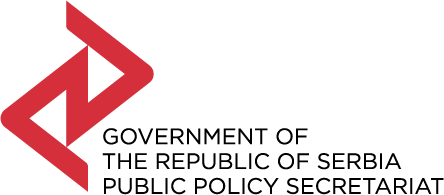Apart from the hosts, the representatives of the Ministry of Human and Minority Rights and Social Dialogue, namely Acting Assistant Minister Ivana Joksimović, and the United Nations Delegation and the UN Human Rights Unit in Serbia headed by Françoise Jacob, permanent coordinator of the UN in Serbia, representative of Centre for Democracy Foundation, Nataša Vučković and Ivana Krstić, Professor of the Faculty of Law of the University of Belgrade participated in the meeting.
“PPS is implementing a series of activities related to the implementation of The 2030 Agenda in the Republic of Serbia, connecting public policy documents with sustainable development goals. In addition, an interactive map of these links has been published to make this topic as accessible and transparent as possible to the public, and each year, we have been updating the report on the compliance of our public policies with The 2030 Agenda” said Sanja Mešanović, Deputy Director of the Public Policy Secretariat.
“Expertise in state administration on these matters exists in a limited number of institutions, mainly in those responsible for these fields, but also in other institutions where sectoral policies are created, and these capacities need to be further reinforced.”
The Deputy Director of the Republic Secretariat for Public Policies, Sanja Mešanović, pointed out that the PPS is committed to building a system that supports the creation of public policies towards the development of society and the economy, applying the principles of sustainable development using quality assessment mechanism of public policy and regulatory impact analysis on the economy and citizens.
“This commitment also includes the obligation of performing impact assessment on social development, i.e. how public policy solutions will affect a specific group of the population, which groups will be affected, and in particular, what impact it may have on the vulnerable groups, primarily on the poor and socially excluded individuals and groups (such as persons with disabilities, children, youth, women, seniors over 65, members of the Roma national minority, uneducated, unemployed, refugees and internally displaced persons and the population of rural areas and such other vulnerable social groups). Through these analyses, it is considered whether the proposed public policy solution will affect their rights and obligations, employment, the quality or availability of the social protection system, the health system or the education system, especially in terms of equal access to services and rights for vulnerable groups”, stated Mešanović.
Through joint work, the UN Human Rights Unit in Serbia and the MHMRSD supported by the Office of the UN High Commissioner for Human Rights, created an instrument to include the leave no one behind principle in the legal and strategic documents of the Republic of Serbia (Leave No One Behind/LNOB).
This document was prepared by the representatives of the academia, civil society, the National Convention on the EU, together with the PPS.
The conclusion of the meeting is to formulate proposals for the development of instruments in the Republic of Serbia in order to achieve sustainable development goals based on the opinions and experiences presented.

